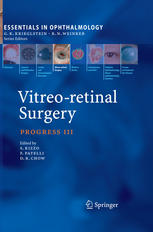

Most ebook files are in PDF format, so you can easily read them using various software such as Foxit Reader or directly on the Google Chrome browser.
Some ebook files are released by publishers in other formats such as .awz, .mobi, .epub, .fb2, etc. You may need to install specific software to read these formats on mobile/PC, such as Calibre.
Please read the tutorial at this link: https://ebookbell.com/faq
We offer FREE conversion to the popular formats you request; however, this may take some time. Therefore, right after payment, please email us, and we will try to provide the service as quickly as possible.
For some exceptional file formats or broken links (if any), please refrain from opening any disputes. Instead, email us first, and we will try to assist within a maximum of 6 hours.
EbookBell Team

4.0
46 reviewsSince the introduction of vitrectomy in the 1970s, vitreoretinal surgery has rapidly developed. Initially, new instrumentations were created to facilitate intraocular maneuvers and to treat almost all the vitreoretinal pathologies. High speed vitrectome probs, forceps, scissors, endolaser probes, and new light sources (xenon/photon light) permit us to perform safer surgeries.
However, in the last few years the approach to vitreoretinal surgery has changed with the introduction of small gauge instruments and sutureless surgery. At present there is still confusion among vitreoretinal surgeons about the use of 25-, 23- or 20-gauge sutureless systems.
Leading surgeons in the field were recruited to offer their insights into the sutureless techniques they perform.
Topics dealt with in the book include:
fluidics and technical characteristics of 23- and 25-gauge systems
basic vitrectomy techniques of 23- and 25-gauge systems
sclerotomy characteristics of the sutureless approach
advantages and disadvantages of the sutureless technique
vitreoretinal pathologies treated with 23- and 25-gauge systems
complications of the sutureless technique
current clinical data